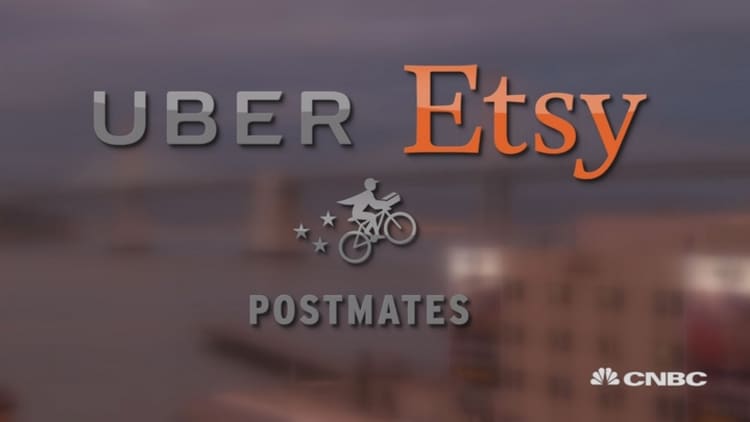
As the debate grows over whether workers in the gig economy should be classified as independent contractors or employees with benefits, one start-up has become the insurance broker for companies including Uber and Etsy.
Launched in 2013, San Francisco-based Stride Health has secured partnerships with companies including TaskRabbit and Postmates, an on-demand network of couriers. Stride Health so far has raised more than $15 million.
The company essentially is an online insurance broker and helps workers find health coverage. And to be clear, consumers — not the start-ups they work for — foot the bill for coverage if they decide to enroll. Stride Health doesn't charge consumers to use the service. The company makes money by pocketing a commission from insurance company plans, featured on Stride Health's platform.
Stride Health is available in all 50 states. The company's online platform lists more than 230 insurance carriers, including the big five — UnitedHealth Group, Cigna, Anthem, Humana and Aetna.
"We identified a pretty compelling market need in the on-demand economy," said Noah Lang, chief executive and co-founder of Stride Health. "We had independent working Americans gathering on these platforms to build their own self-employed lifestyle, but there was one major gap — benefits."
Thanks to the Affordable Care Act, which requires Americans to have health insurance or face penalties, many of those who enroll on Stride Health pocket insurance subsidies to lower their plan costs, Lang said.
Individual freelancers not working for start-ups like Uber that Stride Health has a partnership with can also use the online platform. Stride Health declined to detail how many consumers are enrolled in their platform.
"Having the right health insurance is vital to helping our sellers save money, stay healthy and have time to focus on what they love doing," Etsy spokeswoman Nikki Summer said in an email to CNBC.
Of course, it's ironic some gig economy companies are not paying benefits and instead point their workers to an insurance broker, where workers can pay for benefits themselves.
Protections for workers in the sharing economy have become a contentious issue. A class action suit against Uber is set for June. The suit was brought by some Uber drivers, who want to be reclassified as employees.
Additionally, rival ride-hailing company Lyft just settled a similar case with several drivers, falling short of reclassification but offering some beefed up benefits
Read MoreSome Uber, Lyft drivers push for workplace protections
"For Etsy, it [Stride Health] could be a really helpful service. People selling goods on Etsy aren't likely to be treated as employees under the law," said Rebecca Smith, deputy director of the National Employment Law Project, an advocacy group.
In Uber's case however, pointing drivers to buying their own health insurance raises more complex questions.
"If Uber is an employer, and the federal court hearing the class action against it has already held that it is a presumptive employer, it's legally required to cover its workforce," Smith said in an email to CNBC. "In that case, sending drivers off to buy their own insurance is simply dodging its legal obligations to its workers."
Uber and Postmates did not respond to request for comment on their partnerships with Stride Health.
TaskRabbit, one of the first companies to partner with Stride Health, says the insurance platform along with TaskRabbit's overall business model ultimately allows for worker flexibility.
"We are not looking to reclassify because the number one thing our 'Taskers' want is flexibility," TaskRabbit Chief Operating Officer Stacy Brown-Philpot said.
Said Stride Health's Lang: "These on-demand economy companies are actually looking for ways to better support their workforces."


